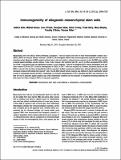| dc.contributor.author | Ritter, Thomas | |
| dc.date.accessioned | 2015-11-20T12:46:33Z | |
| dc.date.available | 2015-11-20T12:46:33Z | |
| dc.date.issued | 2012 | |
| dc.identifier.citation | Schu, S., Nosov, M., O'Flynn, L., Shaw, G., Treacy, O., Barry, F., . . . Ritter, T. (2012). Immunogenicity of allogeneic mesenchymal stem cells. Journal of Cellular and Molecular Medicine, 16(9), 2094-2103. | en_IE |
| dc.identifier.issn | 1582-4934 | |
| dc.identifier.uri | http://hdl.handle.net/10379/5343 | |
| dc.description | Journal article | en_IE |
| dc.description.abstract | Mesenchymal stem cells (MSCs) inhibit proliferation of allogeneic T cells and express low levels of major histocompatibility complex class I (MHCI), MHCII and vascular adhesion molecule-1 (VCAM-1). We investigated whether their immunosuppressive properties and low immunophenotype protect allogeneic rat MSCs against cytotoxic lysis in vitro and result in a reduced immune response in vivo. Rat MSCs were partially protected against alloantigen-specific cytotoxic T cells in vitro. However, after treatment with IFN-? and IL-1 beta, MSCs upregulated MHCI, MHCII and VCAM-1, and cytotoxic lysis was significantly increased. In vivo, allogeneic T cells but not allogeneic MSCs induced upregulation of the activation markers CD25 and CD71 as well as downregulation of CD62L on CD4+ T cells from recipient rats. However, intravenous injection of allo-MSCs in rats led to the formation of alloantibodies with the capacity to facilitate complement-mediated lysis, although IgM levels were markedly decreased compared with animals that received T cells. The allo-MSC induced immune response was sufficient to lead to significantly reduced survival of subsequently injected allo-MSCs. Interestingly, no increased immunogenicity of IFN-? stimulated allo-MSCs was observed in vivo. Both the loss of protection against cytotoxic lysis under inflammatory conditions and the induction of complement-activating antibodies will likely impact the utility of allogeneic MSCs for therapeutic applications. | en_IE |
| dc.format | application/pdf | en_IE |
| dc.language.iso | en | en_IE |
| dc.relation.ispartof | Journal Of Cellular And Molecular Medicine | en |
| dc.rights | Attribution-NonCommercial-NoDerivs 3.0 Ireland | |
| dc.rights.uri | https://creativecommons.org/licenses/by-nc-nd/3.0/ie/ | |
| dc.subject | Mesenchymal stem cells | en_IE |
| dc.subject | Allo-antibody | en_IE |
| dc.subject | Complement | en_IE |
| dc.subject | Immunogenicity | en_IE |
| dc.subject | Acute myocardial infarction | en_IE |
| dc.subject | Proliferation in vitro | en_IE |
| dc.subject | Marrow stromal cells | en_IE |
| dc.subject | Versus host disease | en_IE |
| dc.subject | Acute renal failure | en_IE |
| dc.subject | Immune response | en_IE |
| dc.subject | Cardiac allograft | en_IE |
| dc.subject | Gene therapy | en_IE |
| dc.subject | Nitric oxide | en_IE |
| dc.subject | Calf serum | en_IE |
| dc.title | Immunogenicity of allogeneic mesenchymal stem cells | en_IE |
| dc.type | Article | en_IE |
| dc.date.updated | 2015-11-19T09:51:43Z | |
| dc.identifier.doi | 10.1111/j.1582-4934.2011.01509.x | |
| dc.local.publishedsource | http://dx.doi.org/10.1111/j.1582-4934.2011.01509.x | en_IE |
| dc.description.peer-reviewed | peer-reviewed | |
| dc.contributor.funder | |~| | |
| dc.internal.rssid | 2469097 | |
| dc.local.contact | Thomas Ritter, School Of Medicine, Regenerative Medicine Institute, Biosciences, Dangan. 5329 Email: thomas.ritter@nuigalway.ie | |
| dc.local.copyrightchecked | Yes | |
| dc.local.version | PUBLISHED | |
| nui.item.downloads | 478 | |


